Managing High Cholesterol and Lipids: Harnessing the Power of Natural Remedies
High cholesterol and elevated lipid levels significantly increase the risk of cardiovascular diseases, high blood pressure, and diabetes. Instead of resorting to pharmaceuticals immediately, exploring traditional herbal medicine and food as medicine can provide safer alternatives.
Several herbs are renowned for their ability to lower blood lipids, including garlic, roselle, ginger, and certain sensitive plants. However, excessive use of any single herb may lead to unintended adverse effects. Therefore, it’s advisable to incorporate them into your diet traditionally or combine them with other herbs in medicinal formulas.

As mentioned earlier, the taste of an herb can indicate its benefits. Naturally sour fruits like lime, roselle, tamarind, and Indian gooseberry aid in cleansing lipids from the body, excluding fermented sour foods. Additionally, bitter herbs such as bitter gourd, pea eggplants, or chiang da can support liver and pancreas function, enhancing the body’s ability to process fat and sugar effectively.
Thai traditional medicine clinics often offer herbal remedies to effectively reduce fat. “Ya Hom” is readily available at pharmacies selling Thai traditional medicine and is particularly beneficial for older individuals in improving blood circulation. Simple herb combinations, such as bale, roselle, and jujube; ginger, wood ear mushroom, and jujube; or triphala, are commonly used to lower blood lipids by boiling them to make tea.
In addition to herbal remedies, lifestyle modifications play a crucial role. Adequate sleep before 10 p.m. allows the liver to rest and rejuvenate, while avoiding alcohol, fatty foods, and smoking, and maintaining hydration throughout the day supports overall health. Furthermore, keeping your colon clean can also aid in blood cleansing, thereby removing excess lipids.
Combining traditional remedies with modern dietary and exercise guidelines can effectively manage blood lipids. If you’re currently using conventional medication, incorporating herbal medicine under the supervision of a Thai traditional doctor is advisable. Once blood tests show improvement, pharmaceuticals can be gradually tapered off. Ultimately, maintaining a healthy diet, lifestyle, and exercise regimen is essential for long-term management.


